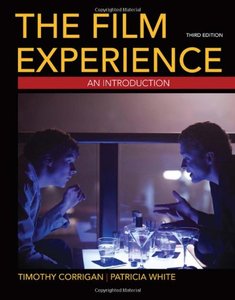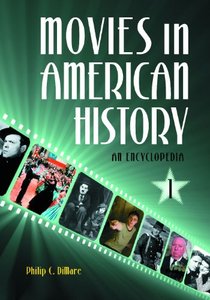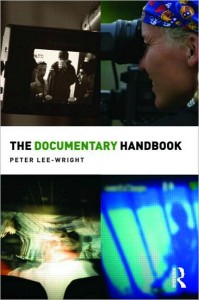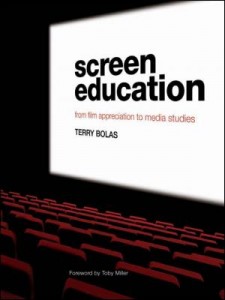 The Film Experience is a comprehensive introduction to film that recognizes students as movie fans while surpassing all other texts in helping them understand the art form’s full scope. Noted scholars and teachers Tim Corrigan and Patricia White capture the complete film experience, situating their strong coverage of the medium’s formal elements within the larger cultural contexts that inform the ways we all watch film—from economics and exhibition to marketing and the star system. A host of learning tools gives students the support they need to make the transition from movie fan to critical viewer. Now with a sharper focus that highlights the essential formal and cultural concepts of cinema, and a powerful new suite of video and media, The Film Experience is the consummate introductory film text.
The Film Experience is a comprehensive introduction to film that recognizes students as movie fans while surpassing all other texts in helping them understand the art form’s full scope. Noted scholars and teachers Tim Corrigan and Patricia White capture the complete film experience, situating their strong coverage of the medium’s formal elements within the larger cultural contexts that inform the ways we all watch film—from economics and exhibition to marketing and the star system. A host of learning tools gives students the support they need to make the transition from movie fan to critical viewer. Now with a sharper focus that highlights the essential formal and cultural concepts of cinema, and a powerful new suite of video and media, The Film Experience is the consummate introductory film text.
Monthly Archives: October 2012
Writing, Directing, and Producing Documentary Films and Videos Third Edition by Alan Rosenthal
Philip C. DiMare, “Movies in American History: An Encyclopedia, Volumes I-III”
 Movies in American History: An Encyclopedia is a reference text focused on the relationship between American society and movies and filmmaking in the United States from the late 19th century through the present. Beyond discussing many important American films ranging from Birth of a Nation to Star Wars to the Harry Potter film series, the essays included in the volumes explore sensitive issues in cinema related to race, class, and gender, authored by international scholars who provide unique perspectives on American cinema and history.
Movies in American History: An Encyclopedia is a reference text focused on the relationship between American society and movies and filmmaking in the United States from the late 19th century through the present. Beyond discussing many important American films ranging from Birth of a Nation to Star Wars to the Harry Potter film series, the essays included in the volumes explore sensitive issues in cinema related to race, class, and gender, authored by international scholars who provide unique perspectives on American cinema and history.
Peter Lee-Wright, “The Documentary Handbook”
 The Documentary Handbook is a critical introduction to the documentary film, its theory and changing practices. The book charts the evolution of documentary from screen art to core television genre, its metamorphosis into many different types of factual TV programme and its current emergence in forms of new media. It analyses those pathways and the transformation of means of production through economic, technical and editorial changes.
The Documentary Handbook is a critical introduction to the documentary film, its theory and changing practices. The book charts the evolution of documentary from screen art to core television genre, its metamorphosis into many different types of factual TV programme and its current emergence in forms of new media. It analyses those pathways and the transformation of means of production through economic, technical and editorial changes.
The Documentary Handbook explains the documentary process, skills and job specifications for everyone from industry entrants to senior personnel, and shows how the industrial evolution of television has relocated the powers and principles of decision-making. Through the use of professional Expert Briefings it gives practical pointers about programme-making, from research, developing and pitching programme ideas to their production and delivery through a fast-evolving multi-platform universe.
‘The Documentary Handbook is mandatory reading for those who want a critical understanding of the place of factual formats in today’s exploding television and media industry, as well as expert guidance in complex craft skills in order to fully participate. The practical advice and wisdom here is second to none.’ – Tony Steyger, Principal Lecturer, Southampton Solent University, UK
Terry Bolas, “Screen Education: From Film Appreciation to Media Studies”
 In Screen education, Terry Bolas provides the first definitive history of the development of film and television studies in Britain, from its origins as a grassroots movement to its current status as serious scholarship. The focus is on the United Kingdom, where the development mirrors that of film education in North America and Australia. Bolas’s account describes the voluntary efforts of activists in the Society for Education in Film and Television and their relationship with British Film Institute’s Education Department. Though much documentary evidence has been lost, Bolas’s work incorporates personal archives and interviews with key figures, making this a critical record of the rise of cinema and television studies.
In Screen education, Terry Bolas provides the first definitive history of the development of film and television studies in Britain, from its origins as a grassroots movement to its current status as serious scholarship. The focus is on the United Kingdom, where the development mirrors that of film education in North America and Australia. Bolas’s account describes the voluntary efforts of activists in the Society for Education in Film and Television and their relationship with British Film Institute’s Education Department. Though much documentary evidence has been lost, Bolas’s work incorporates personal archives and interviews with key figures, making this a critical record of the rise of cinema and television studies.

